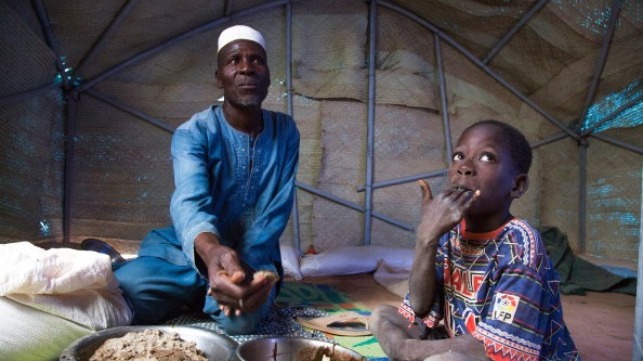 Photo: WFP/ Marwa Awad, A family eating their meal in Burkina Faso
Photo: WFP/ Marwa Awad, A family eating their meal in Burkina Faso
By The Maritime Executive 04-21-2020 06:37:41
The COVID-19 pandemic could almost double the number of people suffering acute hunger, pushing it to 265 million by the end of 2020, the United Nations World Food Programme (WFP) has warned.
The number of people facing acute food insecurity stands to rise to 265 million from 135 million in 2019. The WFP projection was announced alongside the release of the Global Report on Food Crises produced by WFP and 15 other humanitarian and development partners. WFP’s food programs offer a lifeline to almost 100 million vulnerable people globally.
The majority of people suffering acute food insecurity in 2019 were in countries affected by conflict (77 million), climate change (34 million) and economic crises (24 million people). The 10 countries which constituted the worst food crises in 2019 were: Yemen, the Democratic Republic of the Congo, Afghanistan, Venezuela, Ethiopia, South Sudan, Syria, the Sudan, Nigeria and Haiti.
WFP’s Senior Economist, Arif Husain said: “COVID-19 is potentially catastrophic for millions who are already hanging by a thread. It is a hammer blow for millions more who can only eat if they earn a wage. Lockdowns and global economic recession have already decimated their nest eggs. It only takes one more shock – like COVID-19 – to push them over the edge. We must collectively act now to mitigate the impact of this global catastrophe.”
G20 Agricultural Ministers Cooperate on Food Security

Husain’s words preceded an extraordinary meeting held on Wednesday G20 agricultural ministers. The ministers committed to acting together to safeguard global food security by ensuring the continued flow of food and agricultural products across borders.
Participants in the virtual conference agreed to guard against any unjustified restrictive measures that could lead to excessive food price volatility in international markets, and they agreed that emergency measures in the context of the COVID-19 pandemic must be targeted, proportionate, transparent, and temporary. They should not create unnecessary barriers to trade or disruption to global food supply chains and should be consistent with World Trade Organization (WTO) rules.
“We reaffirm our agreement not to impose export restrictions or extraordinary taxes on food and agricultural products purchased for non-commercial humanitarian purposes by the World Food Programme (WFP) and other humanitarian agencies,” said the ministers in a statement, noting that the G20 Agricultural Market Information System indicates that at present global food supplies are adequate and food markets remain well balanced.
“We will work together to help ensure that sufficient, safe, affordable, and nutritious food continues to be available and accessible to all people, including the poorest, the most vulnerable, and displaced people in a timely, safe, and organized manner, consistent with national requirements. Acknowledging the critical role of the private sector in food systems, we call for enhanced cooperation between the public and private sectors to help mobilize rapid and innovative responses to impacts of this pandemic on the agriculture and food sectors.
“Under the current challenging circumstances, we stress the importance of avoiding food losses and waste caused by disruptions throughout food supply chains, which could exacerbate food insecurity and nutrition risks and economic loss. We stress the need to strengthen the sustainability and resilience of food systems globally, including to future shocks from disease and pest outbreaks, and to the global challenges that drive these shocks.”
WTO Director-General Roberto Azevêdo urged the ministers to act collectively to ensure that responses to the COVID-19 pandemic do not unintentionally create food shortages. He stressed the importance of ensuring that food continues to flow from countries with a food surplus to countries in deficit as three billion people depend on international trade for their food security.
Azevêdo called for enhanced cooperation to ensure that international markets continue to be seen as a reliable source of food supply. “The COVID-19 health crisis is already a major economic and social crisis. Let’s not add a food security crisis.”
source: www.maritime-executive.com


